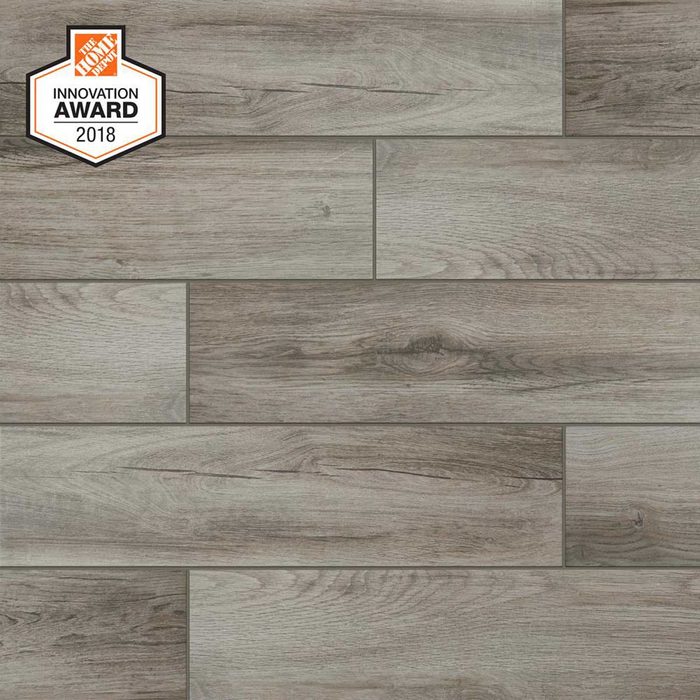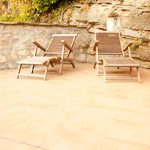What to Know About Outdoor Porcelain Tile

Give up the hassle of stone and concrete slabs. Find out why outdoor porcelain tile is the most durable and versatile material for outdoor flooring.
Our editors and experts handpick every product we feature. We may earn a commission from your purchases.
Historians estimate that the ancient Chinese perfected porcelain more than 1,000 years ago. The material is usually associated with delicate kitchenware or figurines, but the medieval Chinese saw the material’s greater potential centuries ago. The 260-foot porcelain tower of Nanjing was constructed with porcelain bricks in 1431 and stood for more than four centuries.
In recent years porcelain tiles have grown in availability and popularity, especially for outdoor applications.
On This Page
What is Porcelain Tile?
Porcelain tile is in the ceramic family, but it is manufactured to higher standards than regular ceramic products. Highly refined and purified clay is fired for longer and at higher temperatures than other ceramics. The result is a customizable, extremely durable material that can be used on floors or walls indoors and outdoors.
What Are the Different Types of Porcelain Tile?
Unglazed Porcelain Tiles
These have no outer finish, so every tile has a unique pattern. Though lacking a protective coat, unglazed porcelain tiles are naturally weather and wear resistant. Unglazed tiles can be made with any texture, and also be polished for a glossy appearance. Unglazed tiles fall into two categories:
-
Full bodied or through body tiles, which have no added color. The vein and grain patterns run through the entire thickness of each tile.
-
Double-loaded tiles, which are made of two layers of clay pressed together, making them especially durable for high-traffic areas. Two layers of different colors can be combined to create unique patterns.
Glazed Porcelain Tiles
These are sealed with a protective coat. They can be solid colored or patterned, and buyers can often choose between a matte, semi-polished or gloss finish. Glazed tiles fall into two categories:
- Printed tiles, which undergo a special glazing process where a digital image is printed on the tile. This means porcelain tiles can be made to convincingly imitate wood, stone or any other flooring type.
-
Color bodied tiles, which have added color through their entire thickness as well as a surface glaze for protection and aesthetic value.
Porcelain tiles are also divided into five grades by the Porcelain Enamel Institute (PEI). Grade one is the least durable, while grade five is the most durable.
Is Porcelain Tile Good for Outdoor Use?
Porcelain tiles are an excellent material for outdoor applications for several reasons:
-
All porcelain tiles have a water absorption rate of less than 0.5 percent, making them stain and weather resistant. Because they absorb almost no water, porcelain tiles won’t crack in freezing temperatures like other materials.
-
Porcelain tiles are extremely resistant to UV fading, even when placed in direct sunlight.
-
The manufacturing process of porcelain tiles makes them stronger and more durable than ceramics in high-traffic areas.
The Pros and Cons of Porcelain Tiles
Pros
-
Superior durability to other ceramics in high-traffic areas;
-
Ideal for outdoor applications;
-
Versatility — they can be used indoors and outdoors, and be manufactured with various textures, colors and patterns;
-
Thinner and lighter than other outdoor materials such as stone and concrete;
-
Low maintenance;
-
Moisture, stain and fire resistant.
Cons
-
More expensive than other ceramic products;
-
Heavier than other ceramic products;
-
Difficult to cut without specialized equipment.
Cost and Buying Tips
Porcelain tiles generally cost between $3 and $10 per square foot, although specialized or patterned tiles can cost as much as $35 per square foot. Glazed and unglazed porcelain tiles are durable and wear-resistant in outdoor settings.
Aesthetics aside, the PEI grade of porcelain tiling is the most important consideration when making a purchase. PEI grade 3 or higher should be used for any flooring application with moderate traffic. Well-known porcelain tile suppliers include Marazzi, Interceramic and Daltile.
Installation
Porcelain tile installation is similar to any other outdoor tiling project. It’s time consuming and requires technical know-how. Porcelain tiles are incredibly hard, and although this makes them durable, it also means you need specialized equipment to cut the tiles. Avoid installing porcelain tiles yourself unless you’re an experienced DIYer who’s willing to invest in some tools for the job.
Maintenance and Cleaning
Porcelain tiles can be cleaned easily with water and a mild detergent. For tougher dirt or deeper cleaning, try a vinegar-water mixture or a dedicated tile cleaner along with a soft-bristle brush. Avoid using brushes, whenever possible, on polished or glazed tiles. Never use bleach or ammonia-based cleaners, oil-based detergents, cleaners with dye, steel wool and hard-bristle brushes.


